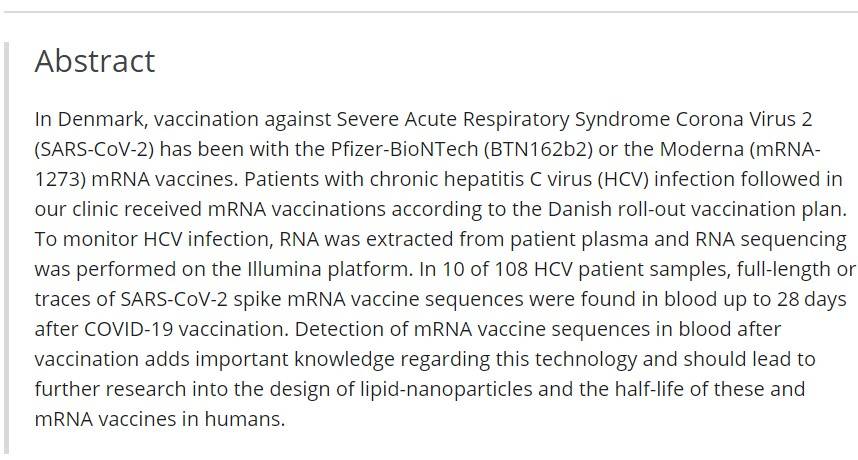
Danish Research on mRNA Gives Further Evidence of Dangers of mRNA “Vaccines” in Latest Findings
Warm greetings to today’s discussion, where we’ll be talking about groundbreaking research from Denmark on messenger RNA vaccines.
It is commonly believed that the messenger RNA in vaccines disappears from the bloodstream within a short time. However, Danish researchers have found that 9.3 percent of vaccinated individuals still have messenger RNA in their blood after 28 days, a much longer duration than anticipated.
The research is published in a Danish journal and is available for free download. It shows that both Pfizer and Moderna vaccines, which code for the production of full-length SARS coronavirus 2 spike protein, had RNA encapsulated in lipid nanoparticles in the bloodstream for an unexpectedly long time. Despite the researchers’ surprise, it is clear that the vaccines’ lipid nanoparticles are not replicating.

The study also found that the RNA sequences in the vaccine are different from those in the virus that codes for the spike protein. As a result, the researchers could determine unequivocally that the RNA in the bloodstream was vaccine-induced and not the result of a natural infection.
To test the efficacy of the vaccines on patients with chronic hepatitis C virus infections, the researchers extracted messenger RNA from their plasma. To their surprise, they found that the equipment designed to detect hepatitis C RNA also detected SARS-CoV-2 RNA in 10 out of 108 patients sampled, indicating that the vaccines’ RNA was present in their bloodstream.
The researchers note that Denmark’s aspiration method, in which they draw back to check if they’re in a blood vessel before injecting, may lead to fewer vaccines in the bloodstream than in countries where they do not do this check. The study’s authors declare no conflicts of interest, as it should be for all scientific papers.
In conclusion, the Danish study’s findings challenge the conventional wisdom that the messenger RNA in vaccines disappears quickly from the bloodstream. Instead, it suggests that vaccines’ RNA remains in the body for a more extended period, although the vaccines’ lipid nanoparticles are not replicating. The implications of these findings for vaccine efficacy and safety require further research, but it is a promising start towards understanding the mechanisms of messenger RNA vaccines in the human body.
More and more studies like this Danish research on mRNA have been occurring lately. Maybe soon the science community will finally explain what has been found inside cadaver bodies of those who had the mRNA jabs…
